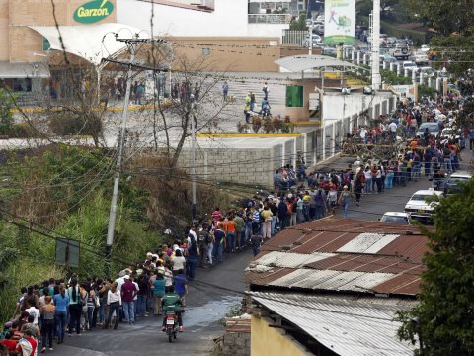Long lines at grocery stores and ration cards that prevent citizens from buying more than the allotted amount of basic needs, such as flour, milk, vegetable oil, and toilet paper, have become the norm in Venezuela. This week, however, the government has begun to ration an even more essential commodity: water.
According to Bloomberg News, a drought has triggered rationing of tap water in the capital, Caracas, where residents must form lines that last hours to fill jugs of water for drinking, showering, and other needs. One witness testified to waiting in line for six hours for tap water, while another protested that even the plastic 5-liter bottles the government mandates during the ration are scarce. As the report notes, “The rationing of tap water amid a drought and a shortage of bottles because of currency controls are forcing people to form long lines at grocery stores and bottle shops as soon as deliveries are made.”
In addition to a lack of tap water, bottled drinking water at grocery stores is extremely difficult to come by. Industry association Ambar tells Bloomberg that the price of producing and distributing water bottles in Venezuela has more than doubled in two and a half years, a product of the plummeting value of the Venezuelan Bolivar and the lack of resources for industry in the nation.
The Venezuelan government has blamed the South American climate phenomenon El Niño for its rationing of water and upcoming rationing of electricity. El Niño is responsible for droughts in South America that also affect energy production. Electricity rationing is not yet a nationwide phenomenon, but it has already been imposed on the western state of Zulia.
The moderate opposition group, the Table of Democratic Unity (MUD), has protested that “the lack of responsibility and improvisation with which the government acts, postponing investments, maintenance, and opportune decisions” is to blame for water shortages. MUD had begun negotiating talks with the government of Venezuela to end the current wave of protests in the country, but it has halted these talks, as the government had little desire to change.
The rationing of water follows the April debut of new ration cards nationally; President Nicolás Maduro announced that Venezuelans would no longer be allowed to freely buy essential products, such as flour, oil, and milk. The rations in the OPEC country were announced as a “second economic offensive” against, allegedly, countries like the United States, which had denounced human rights violations in the country.

COMMENTS
Please let us know if you're having issues with commenting.